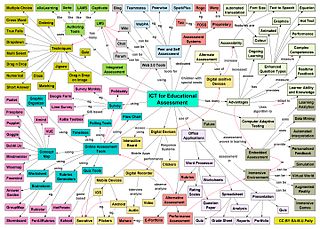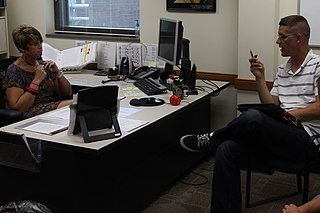Related Research Articles

A community college is a type of educational institution. The term can have different meanings in different countries: many community colleges have an "open enrollment" for students who have graduated from high school. The term usually refers to a higher educational institution that provides workforce education and college transfer academic programs. Some institutions maintain athletic teams and dormitories similar to their university counterparts.

Outcome-based education or outcomes-based education (OBE) is an educational theory that bases each part of an educational system around goals (outcomes). By the end of the educational experience, each student should have achieved the goal. There is no single specified style of teaching or assessment in OBE; instead, classes, opportunities, and assessments should all help students achieve the specified outcomes. The role of the faculty adapts into instructor, trainer, facilitator, and/or mentor based on the outcomes targeted.

Information and communications technology (ICT) is an extensional term for information technology (IT) that stresses the role of unified communications and the integration of telecommunications and computers, as well as necessary enterprise software, middleware, storage and audiovisual, that enable users to access, store, transmit, understand and manipulate information.
Forest school is an outdoor education delivery model in which students visit natural spaces to learn personal, social and technical skills. It has been defined as "an inspirational process that offers children, young people and adults regular opportunities to achieve and develop confidence through hands-on learning in a woodland environment". Forest school is both a pedagogy and a physical entity, with the use often being interchanged. The plural "schools" is often used when referring to a number of groups or sessions.

Teacher education or teacher training refers to the policies, procedures, and provision designed to equip (prospective) teachers with the knowledge, attitudes, behaviors, and skills they require to perform their tasks effectively in the classroom, school, and wider community. The professionals who engage in training the prospective teachers are called teacher educators.
Advance HE is a British charity and professional membership scheme promoting excellence in higher education. It advocates evidence-based teaching methods and awards fellowships as professional recognition for university teachers. Founded in 2003, the Higher Education Academy was responsible for the UK Professional Standards Framework for higher education practitioners and merged to form Advance HE on 21 March 2018.

The Association of University Administrators (AUA) is the professional body for higher education administrators and managers in the United Kingdom and Republic of Ireland.
Community education, also known as community-based education or community learning & development, is an organization's programs to promote learning and social development work with individuals and groups in their communities using a range of formal and informal methods. A common defining feature is that programmes and activities are developed in dialogue with communities and participants. The purpose of community learning and development is to develop the capacity of individuals and groups of all ages through their actions, the capacity of communities, to improve their quality of life. Central to this is their ability to participate in democratic processes.
The Self-review Framework is an online tool that schools in the United Kingdom can use to assess and benchmark their use of technology (ICT). It enables schools to identify where they are and shows the practical steps they can take to improve their use of technology. The Self-review Framework provides a structure for reviewing a school's use of technology and its impact on school improvement. It is designed to support ALL schools. It complements the work schools currently undertake for Ofsted and can be provided as evidence for a school's Self Evaluation Framework (SEF).

Career counseling is a type of advice-giving and support provided by career counselors to their clients, to help the clients manage their journey through life, learning and work changes (career). This includes career exploration, making career choices, managing career changes, lifelong career development and dealing with other career-related issues. There is no agreed definition of career counseling worldwide, mainly due to conceptual, cultural and linguistic differences. However, the terminology of 'career counseling' typically denotes a professional intervention which is conducted either one-on-one or in a small group. Career counseling is related to other types of counseling. What unites all types of professional counseling is the role of practitioners, who combine giving advice on their topic of expertise with counseling techniques that support clients in making complex decisions and facing difficult situations.

This National Conference is the biennial conference of the Australian Council for Computers in Education (ACCE). The conference opens to anyone who in interested in sharing their digital teaching experiences. The first conference took place in Melbourne, 1983. Between 1983-1996, the conference was held annually across Australia. After 1996, the conference became biennial. From 1994, a series of frameworks were launched in Australia to integrate Information and Communication Technology(ICT) into education. Western Australia's 2001 Competency framework for Teachers identified teachers as an important component in developing computer education. In 2010, Education Minister Julia Gillard, proposed an education agenda to provide Australia a better education system. Besides ACCE, there are many organizations and conferences supporting the development of computer education in Australia. Technology in education consists of two major approaches: Learning with technology and learning from technology. Technology in education learning and traditional classroom learning have different focuses and defining features. There are also four types of computer education:Bring your own device(BYOD), blended learning, online learning, and flipped learning.
Higher education accreditation is a type of quality assurance process under which services and operations of post-secondary educational institutions or programs are evaluated to determine if applicable standards are met. If standards are met, accredited status is granted by the agency.
The European Network for Accreditation of Engineering Education (ENAEE) was established in 2006 as an organization to promote quality in engineering education across Europe and beyond. It is rooted in the Bologna process which aims to build the European Higher Education Area.
Membership of ENAEE is open to all bodies concerned with educational and professional standards in engineering. Such bodies may include accreditation and quality assurance agencies, professional organisations, associations of higher education institutions, employers’ associations, and engineering student bodies and their associations.
Learning development describes work with students and staff to develop academic practices, with a main focus on students developing academic practices in higher education, which assess the progress of knowledge acquired by the means of structural approaches. Learning developers are academic professionals who: teach, advise and facilitate students to develop their academic practices; create academic development learning resources; and reflect on their own academic practices through a community of practice.
Global citizenship education (GCED) is a form of civic learning that involves students' active participation in projects that address global issues of a social, political, economic, or environmental nature. The two main elements of GCE are 'global consciousness'; the moral or ethical aspect of global issues, and 'global competencies', or skills meant to enable learners to participate in changing and developing the world. The promotion of GCE was a response by governments and NGOs to the emergence of supranational institution, regional economic blocs, and the development of information and communications technologies. These have all resulted in the emergence of a more globally oriented and collaborative approach to education. GCE addresses themes such as peace and human rights, intercultural understanding, citizenship education, respect for diversity and tolerance, and inclusiveness.
The Technological pedagogical content knowledge (TPACK) framework describes the kinds of knowledge required by teachers for the successful integration of technology in teaching. It suggests that teachers need to know about the intersections of technology, pedagogy, and content. Specifically, how these areas of knowledge interact and influence one another in unique and specific contexts. In terms of teaching with technology, it suggests that it impacts not only what we teach but how we teach. This idea was in the zeitgeist in the early 2000s, with scholars working on variations of the idea.
Niki Davis is an educator and researcher based in Aotearoa New Zealand whose work has focused on equipping teachers to effectively deliver information and communication technologies in a global education context. Her research has explored how teaching, learning and assessment can be inclusive and ethically managed in non-traditional spaces involving E-learning while acknowledging the role of the knowledge of indigenous peoples in assisting to build critically reflective research communities. She worked in universities in the United Kingdom and the United States before becoming a Distinguished Professor at the University of Canterbury in 2008, retiring and becoming Professor Emeritus in 2020. Davis has been involved in a range of initiatives and organisations that promote knowledge of digital technologies in education and is widely published in this field.

Keith James Topping is a researcher in education. He designs intervention programs for teachers, parents and others to help children, then researches whether and how they work.

Educational management refers to the administration of the education system in which a group combines human and material resources to supervise, plan, strategise, and implement structures to execute an education system. Education is the equipping of knowledge, skills, values, beliefs, habits, and attitudes with learning experiences. The education system is an ecosystem of professionals in educational institutions, such as government ministries, unions, statutory boards, agencies, and schools. The education system consists of political heads, principals, teaching staff, non-teaching staff, administrative personnel and other educational professionals working together to enrich and enhance. At all levels of the educational ecosystem, management is required; management involves the planning, organising, implementation, review, evaluation, and integration of an institution.

Coaching psychology is a field of applied psychology that applies psychological theories and concepts to the practice of coaching. Its aim is to increase performance, achievement and well-being in individuals, teams and organisations by utilising evidence-based methods grounded in scientific research. Coaching psychology is influenced by theories in various psychological fields, such as humanistic psychology, positive psychology, learning theory and social psychology.
References
- ↑ Jeanette McDonald; Denise Stockley (13 July 2010). Pathways to the Profession of Educational Development: New Directions for Teaching and Learning. John Wiley & Sons. pp. 95–. ISBN 978-0-470-88010-4.
- ↑ Malcolm Tight; Ka Ho Mok; Jeroen Huisman; Christopher Morphew (3 June 2009). The Routledge International Handbook of Higher Education. Routledge. pp. 430–. ISBN 978-1-134-08201-8.
... the move to professionalise and accredit teaching in higher education, with the Staff and Educational Development Association (SEDA) at the forefront of these developments (Beaty, 2006). SEDA was formed in the UK in 1993 by the merger ...
- ↑ Society for Research into Higher Education (1 July 2003). Towards Strategic Staff Development in Higher Education. McGraw-Hill Education (UK). pp. 11–. ISBN 978-0-335-22431-9.
The creation of a fellowship scheme by the British Staff and Educational Development Association (SEDA) in May 1994 is clearly significant ...
- ↑ Carole Baume; Paul Martin; Mantz Yorke (2002). Managing Educational Development Projects: Effective Management for Maximum Impact. Psychology Press. pp. 180–. ISBN 978-0-7494-3904-0.
This is very similar to the approach implemented in 1992 by the UK Staff and Educational Development Association (SEDA) to the accreditation of programmes for the accreditation of teachers in higher education (see Baume and Baume, ...
- ↑ Fran Beaton (5 October 2012). Developing Effective Part-time Teachers in Higher Education: New Approaches to Professional Development. Routledge. pp. 17–. ISBN 978-0-415-51708-9.
By 2003 the OU's Associate Lecturer Development and Accreditation Pathway (ALDAP) was established and recognised through the Staff and Educational Development Association's (SEDA) Professional Development Framework (PDF).
- ↑ Stacey, Elizabeth (30 April 2009). Effective Blended Learning Practices: Evidence-Based Perspectives in ICT-Facilitated Education: Evidence-Based Perspectives in ICT-Facilitated Education. IGI Global. pp. 287–. ISBN 978-1-60566-297-8.
The UK Staff and Educational Development Association (SEDA) professional development framework reflects theoretical concepts and a summary of the findings from various research studies such as those that underpin the work outlined ...